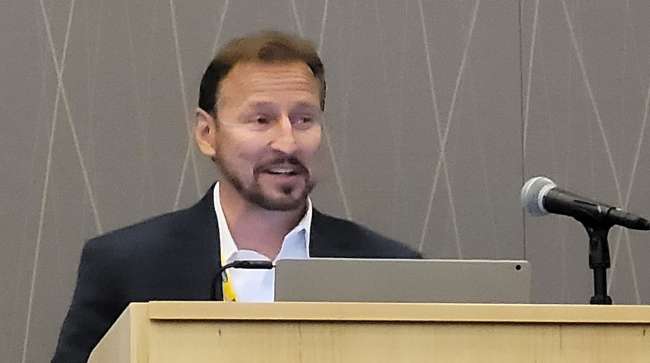Features Editor
Future Looks Bright for Automated Braking

[Stay on top of transportation news: Get TTNews in your inbox.]
CLEVELAND — Industry experts presented an in-depth analysis concerning the future of braking systems during a study group session at American Trucking Associations’ 2021 Technology & Maintenance Council Fall Meeting & Transportation Technology Exhibition.
With automated braking and electronic controlled brake systems (ECBS) technology moving at a fast pace, Richard Beyer, vice president of engineering and R&D at Bendix Commercial Vehicle Systems, is cautiously optimistic about the future.
“I wish I was 18 years old, because there is more change coming in the next five years than we’ve seen in the last 50 to 100 years,” he said Sept. 15. “It is for the better. It’s not going to be less complex, it’s going to get more complex, and the change is going to come at us more fast and more furious.”
In terms of the automated driver, specifically Level 4 “high” automation, Beyer stressed the need for changes in vehicle infrastructure. He noted that systems with more redundancies built into the ECBS system will allow trucks to operate in all weather conditions.
“When you hear news about automated driving Level 4 players, you’ll see corridor images of the Southwest U.S.,” Beyer explained. “That is good as a science experiment, but the reality is that we live in Cleveland, and we don’t have Southwest weather here most of the time.”
He noted that the vehicle combination of the driver and automation is essential to properly handle the road conditions error-free, even in an evasive maneuver.
I wish I was 18 years old, because there is more change coming in the next five years than we’ve seen in the last 50 to 100 years.
Richard Beyer, vice president of engineering and R&D at Bendix Commercial Vehicle Systems
Noting the trend of the transition from drum to disc brakes in the Class 8 market, Meritor Chief Technology Officer John Bennett offered a look into the future of foundation brakes.
He said that from a technology standpoint, the springboard of automated brake systems starts from disc brakes since the technology will rely heavily from such conversion. Bennett noted that factors driving this will be greater stopping power, accessibility for inspection and replacement, reduced fade due to great heat dissipation, increased straight-line stability and lower total cost of ownership.

Drivers want good health and education on emerging technologies. Paul Beavers of PCS Software and Dr. Bethany Dixon of Drivers Health Clinic share their insights. Hear a snippet above, and get the full program by going to RoadSigns.TTNews.com.
He explained further that three global technology trends that would influence foundation brakes going forward would be sustainability via efficiency and environment; the connected intelligence through data and analytics; and electric powertrains through regulatory compliance that could provide environmental benefits as well as a lower cost of ownership.
Bennett said that though the future of brake technology is encouraging, the benefits might not be evident immediately.
“It’s taking so long for our industry to simply adopt disc brakes when it comes technology adoption,” he said. “Even though there are performance advantages, this is such a cost-sensitive industry that unless there is a strong payback, technology adoption takes a long time.”
Want more news? Listen to today's daily briefing below or go here for more info:



